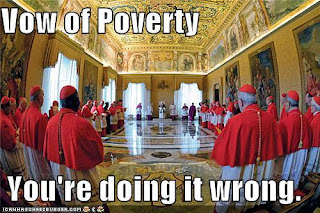Or are we Taylor..? Let's find out.
The English Civil War
The English Civil War started when Charles I decided to dissolved
Parliament. Even though they had the power
of the purse (which he later realized he needed). So from 1629 to 1640 there was no House of
Lords OR House of Commons. Charles I only went running back to Parliament (like
a 'sorry' ex-boyfriend) when he realized that he had hit the debt ceiling and
could not wage war on Scotland. So
Charles ran to Parliament and pretty much had to give in and face reality... he
was wrong. He thought he could be the absolute ruler... NOPE. But instead of kissing and making up Parliament
thought it would be best to convict Charles of high treason and behead him.
Well... That could have gone better.
The Commonwealth
Anyway- after Charles I was out of the picture, the
commonwealth was created. Oliver
Cromwell was put in chards of the government. He was quite the monarch (pretty
ironic considering previous events). Cromwell wound up banning everything
remotely fun and the people of England started to get fed up with him. Luckily
(not for Cromwell) he fell ill with malaria and died.
 |
| Ignore the fact that this is David Cameron. Just think "Happy British People" |
*Read the following conversation on British accents*
Parliament Member #1: "YAY"
Parliament Member #2: "Well who's going to rule now?"
Parliament Member #1: "I hadn't thought of
that"
Parliament Member #2: "What about Charles I's
son?"
Parliament Member #1: "You mean Charles II?"
Parliament Member #2: "Yes!"
Parliament Member #1: "Well I guess so... MAYBE if we
seem really sorry about executing his father"
And so Charles II was put in charge and was "the king
that brought back partying"



































